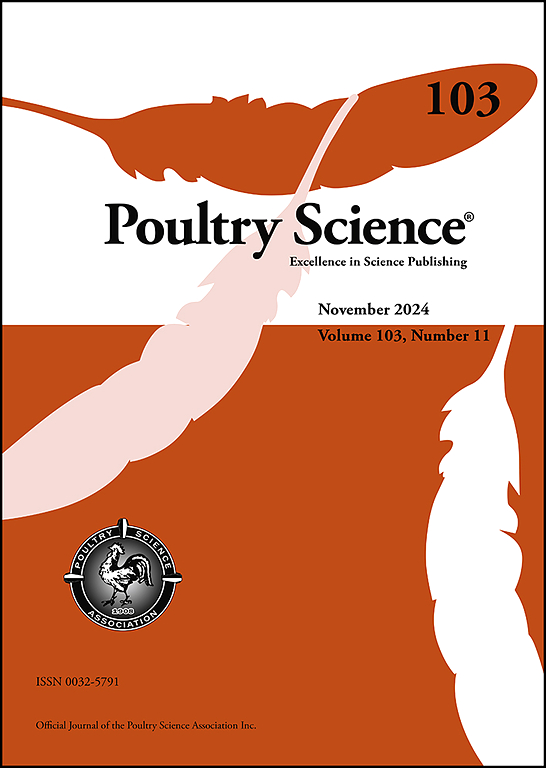Precision biotics enhance growth performance in broiler chickens by selectively modifying their intestinal microbiome to better respond to enteric challenges
IF 4.2
1区 农林科学
Q1 AGRICULTURE, DAIRY & ANIMAL SCIENCE
引用次数: 0
Abstract
Precision biotics (PB) are innovative feed additives designed to influence key metabolic pathways in the microbiome, particularly those involved in short-chain fatty acid (SCFA) production. These SCFAs are crucial for the healthy development and functionality of the gastrointestinal tract (GIT) in chickens. Our hypothesis was that adding a glycan-based PB to the diet would steer microbial metabolism towards increased SCFA production in the ceca, thereby reducing the adverse effects of necrotic enteritis (NE) in chickens. These studies evaluated the supplementation of PB on the cecal microbiome and growth performance in broiler chickens exposed to a necrotic enteritis (NE) challenge. Experiment 1: Day-old chicks were assigned to three treatment groups: a control, a challenged control, and a challenged group supplemented with PB. The birds were vaccinated for coccidiosis at day 0 and challenged with Clostridium perfringens. Cecal content was collected from one bird per pen on days 22 and 42 for microbiome analysis. Experiment 2: Day-old chicks were again assigned to three treatments: control, challenged control, and challenged with PB. All birds were vaccinated for coccidiosis and challenged with Eimeria maxima on day 14 and later with C. perfringens. On day 21, birds were euthanized for NE lesion scoring. In Exp. 1, the supplementation of PB significantly improved (P < 0.05) the growth performance of the challenged birds. An increased relative abundance of species related to SCFA production was observed on day 42, including several Faecalibacterium species (P < 0.05). This was paired with an increased relative abundance of both propionate (P<0.05) and butyrate pathways in birds with PB supplementation. In Exp. 2, on day 21, the challenge impaired growth performance, but the supplementation of PB counteracted this effect (P < 0.05). On day 42, the supplementation of PB improved BW by 10 % (P < 0.0001), and the FCR by 8.4 % (P < 0.0001) when compared to the challenged group. The supplementation of PB reduced NE associated mortality (5.5 vs 0.5 %; P = 0.002) and reduced the lesions characteristic of NE (P < 0.0001). Taken together, the microbiome metabolic shift observed with the supplementation of PB explains the improvement in growth performance, resilience to enteric stress and faster recovery of the intestine, which consequently improves welfare and the sustainability of poultry production.
精密生物制剂通过选择性地改变肉鸡肠道微生物群,提高肉鸡的生长性能,从而更好地应对肠道挑战
精密生物制剂(PB)是一种创新的饲料添加剂,旨在影响微生物组的关键代谢途径,特别是与短链脂肪酸(SCFA)生产有关的代谢途径。这些短链脂肪酸对鸡胃肠道(GIT)的健康发育和功能至关重要。我们的假设是,在日粮中添加以聚糖为基础的铅可以引导微生物代谢,增加盲肠中短链脂肪酸的产生,从而减少鸡坏死性肠炎(NE)的不良影响。这些研究评估了添加PB对坏死性肠炎(NE)侵袭的肉鸡盲肠微生物组和生长性能的影响。试验1:将日龄雏鸡分为3个处理组:对照组、攻毒组和添加PB的攻毒组。雏鸟在第0天接种球虫病疫苗,并用产气荚膜梭菌攻毒。在第22天和第42天,每栏采集一只鸟的盲肠内容物进行微生物组分析。试验2:将日龄雏鸡再次分为对照组、攻毒对照组和PB攻毒3个处理。所有禽类均接种球虫病疫苗,并在第14天接种大艾美耳球虫,随后接种产气荚膜荚膜梭菌。第21天,对雏鸟实施安乐死,进行NE病变评分。在试验1中,添加PB显著提高了(P <;0.05)攻毒鸡的生长性能。在第42天观察到与SCFA生产相关的物种的相对丰度增加,包括几种Faecalibacterium物种(P <;0.05)。这与添加PB的鸟类中丙酸(P<0.05)和丁酸途径的相对丰度增加有关。在试验2中,第21天,挑战损害了生长性能,但添加PB抵消了这种影响(P <;0.05)。第42天,添加PB可使体重提高10% (P <;0.0001), FCR降低8.4% (P <;0.0001)。补充PB可降低NE相关死亡率(5.5% vs 0.5%;P = 0.002),降低了NE的病变特征(P <;0.0001)。综上所述,添加PB后观察到的微生物代谢变化解释了生长性能的改善、对肠道应激的恢复能力和肠道的更快恢复,从而提高了家禽的福利和生产的可持续性。
本文章由计算机程序翻译,如有差异,请以英文原文为准。
求助全文
约1分钟内获得全文
求助全文
来源期刊

Poultry Science
农林科学-奶制品与动物科学
CiteScore
7.60
自引率
15.90%
发文量
0
审稿时长
94 days
期刊介绍:
First self-published in 1921, Poultry Science is an internationally renowned monthly journal, known as the authoritative source for a broad range of poultry information and high-caliber research. The journal plays a pivotal role in the dissemination of preeminent poultry-related knowledge across all disciplines. As of January 2020, Poultry Science will become an Open Access journal with no subscription charges, meaning authors who publish here can make their research immediately, permanently, and freely accessible worldwide while retaining copyright to their work. Papers submitted for publication after October 1, 2019 will be published as Open Access papers.
An international journal, Poultry Science publishes original papers, research notes, symposium papers, and reviews of basic science as applied to poultry. This authoritative source of poultry information is consistently ranked by ISI Impact Factor as one of the top 10 agriculture, dairy and animal science journals to deliver high-caliber research. Currently it is the highest-ranked (by Impact Factor and Eigenfactor) journal dedicated to publishing poultry research. Subject areas include breeding, genetics, education, production, management, environment, health, behavior, welfare, immunology, molecular biology, metabolism, nutrition, physiology, reproduction, processing, and products.
 求助内容:
求助内容: 应助结果提醒方式:
应助结果提醒方式:


